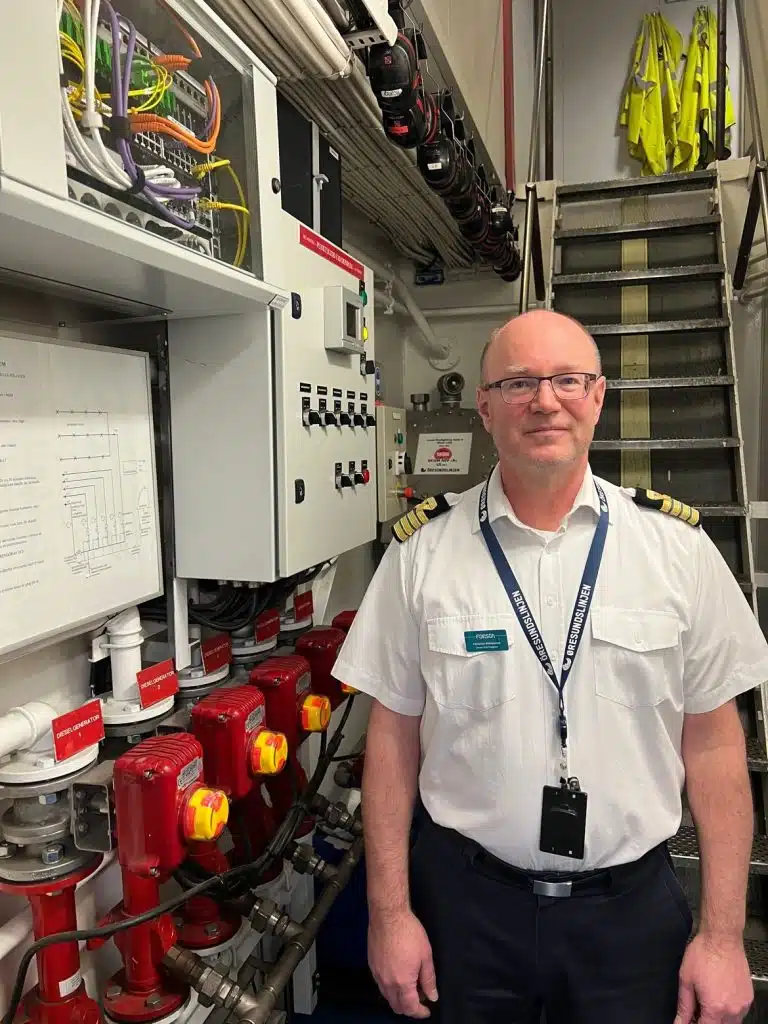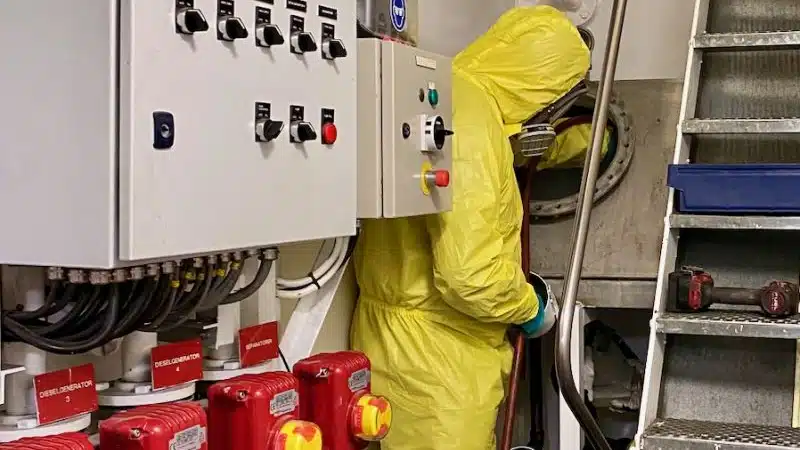Maritime engineering specialist Scanunit has carried out what it believes is the world’s first replacement and decontamination of a PFAS/PFOS1 foam firefighting system on a commercial vessel. Aurora, a 1992-built ferry operated by EQT-owned Öresundslinjen (a subsidiary of Molslinjen), was the vessel concerned and the work was carried out over the weekend of January 27th/28th.
An IMO resolution2 adopted in will see the phase-out of foam firefighting systems that use fluorinated foams containing perfluoro-octane sulfonic acid (PFOS) as the foam-producing component. Because of their negative impact on human health and the environment. The longevity of these chemicals has resulted in them being dubbed ‘Forever Chemicals’.
Work on Aurora involved the removal of some 200 litres of AFFF foam containing PFAS/PFOS followed by decontamination of the tanks, 200 metres of pipelines and 52 spray nozzles of the ship’s firefighting system.
The decontamination was performed by Scanunit using Sani A supplied by LifeClean a specialist chemical provider based in Sweden. Decontamination and cleaning of the system produced 2,200 litres of wastewater which was removed by waste disposal contractor Fortum.
Emptying the system of the PFAS foam began at 22:30 on Saturday and the system was able to be refilled with a fresh supply of fluorine-free foam concentrate by 06:00 on Sunday. Testing of the system after the changeover showed it was now far below the ECHA and EPA restriction of 1 ppm The test carried out by Eurofins laboratory analysts on the Aurora sample returned a result of just 4,400ng/l or 0.0044ppm.
This collaboration between Scanunit, Life-Clean, Johnson Control, and Fortum Waste Solutions underscores a collective commitment to environmental responsibility and innovation in the maritime industry. The successful project not only meets the impending regulatory requirements but also sets a new standard for the industry’s approach to environmental safety and sustainability.
Marcin Mikołajczak, Scanunit’s Managing Director, expressed his company’s dedication to supporting Öresundslinjen’s environmental ambitions. “We are proud to support Öresundslinjen in reaching their environmental goals,” Mikołajczak said. ” Our innovative decontamination process reflects our commitment to delivering environmentally conscious and effective marine engineering solutions.”

Christian Andersson, Senior Chief Engineer, Öresundslinjen/AURORA, commented, “Finally after almost 12 months of evaluating different options to get the ships engine room fire suppression system PFOS/PFAS free we chose to team up with Scanunit and LifeClean to decontaminate the system. Their strong cooperation together with Johnson Control, Fortum Waste Solutions and Eurofins gave us a cost-efficient option which met our expectations. Excellent project planning together with the ship’s crew meant the job was completed during the ships regular weekend night layup avoiding unnecessary down time. The ship is now ready for the 2026 PFOS ban with a fluor-free system and once again our efforts leading the industry in sustainability and environmental responsibility by taking early action has paid back”.
1 – Foam firefighting systems on ships typically make use of a family of synthetic chemical compounds known as perfluoroalkyl and polyfluoroalkyl substances (PFAS). They are used in a variety of applications aside from firefighting because of their very useful properties. But their use is now being questioned as they have been shown to be toxic, bio-accumulative, and very persistent substances in the environment.
The common PFAS-compound in foam systems is perfluoro-octane sulfonic acid (PFOS), although other PFASs may also be used. PFOS has been restricted in most Western countries since 2009 under the Stockholm Convention because of its impact on human health. These restrictions have led to an industrial transition and replacement of PFOS.
2 – Following work by the Ship Systems and Equipment (SSE) sub-committee at the IMO, the Maritime Safety Committee (MSC) in June 2023 adopted resolutions MSC.530(107) amending SOLAS Chapter II-2 and resolutions MSC.534(107) & MSC.535(107) amending the HSC Codes (1994 and 2000) to prohibit the use of firefighting foams containing PFOS. This ban applies to both fixed and portable systems and comes into effect for new ships on 1 January 2026. Systems on existing ships will need to remove the PFOS and dispose of them safely ashore no later than the first survey date on or after January 1, 2026.












